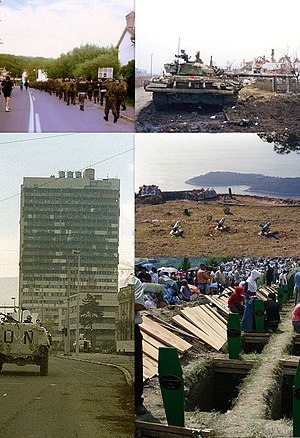Balkan conflict
| Yugoslav Wars | |||||||
|---|---|---|---|---|---|---|---|
 Clockwise from the top-left: Slovenian police escort captured JNA soldiers back to their unit during the 1991 Slovenian war of independence; A destroyed tank during the Battle of Vukovar; Anti-tank missile installations in the siege of Dubrovnik; Reburial of victims from the 1995 Srebrenica massacre on 11 July 2010; UN vehicle driving on the streets of Sarajevo during the siege. |
|||||||
|
|||||||
|
|
|||||||
The Yugoslav Wars were a series of ethnically-based wars and insurgencies fought from 1991 to 1999/2001 inside the territory of the former Yugoslavia. These wars accompanied and facilitated the breakup of the Yugoslav state, when its constituent republics declared independence, but the issues of ethnic minorities in the new countries (chiefly Serbs, Croats and Albanians) were still unresolved at the time the republics were recognized internationally. The wars are generally considered to be a series of separate but related military conflicts which occurred in, and affected, most of the former Yugoslav republics.
Most of the wars ended through peace accords, involving full international recognition of new states, but with massive economic damage to the region. Initially the Yugoslav People's Army (JNA) sought to preserve the unity of the whole of Yugoslavia by crushing the secessionist governments but it increasingly came under the influence of the Serbian government of Slobodan Milošević that evoked Serbian nationalist rhetoric and was willing to use the Yugoslav state to preserve the unity of Serbs in one state. As a result, the JNA began to lose Slovenes, Croats, Kosovar Albanians, Bosniaks, and ethnic Macedonians, and effectively became a Serb army. According to the 1994 United Nations report, the Serb side did not aim to restore Yugoslavia, but to create a "Greater Serbia" from parts of Croatia and Bosnia.
Other irredentist movements have also been brought into connection with the wars, such as "Greater Albania" and "Greater Croatia", however– unlike the Serbian irredentists – these were peacefully abandoned when the international diplomacy negotiated an end to the Croat-Bosniak conflict through Washington agreement and an end of Kosovo's ambitions to unite with Albania, respectively.
...
Wikipedia
